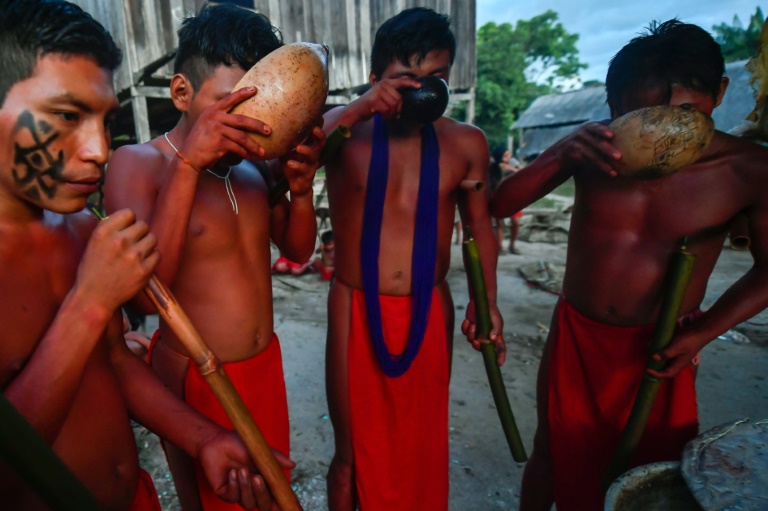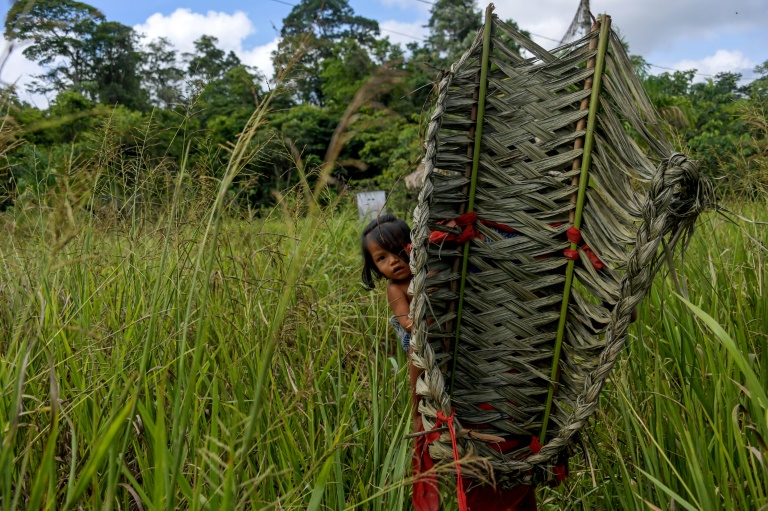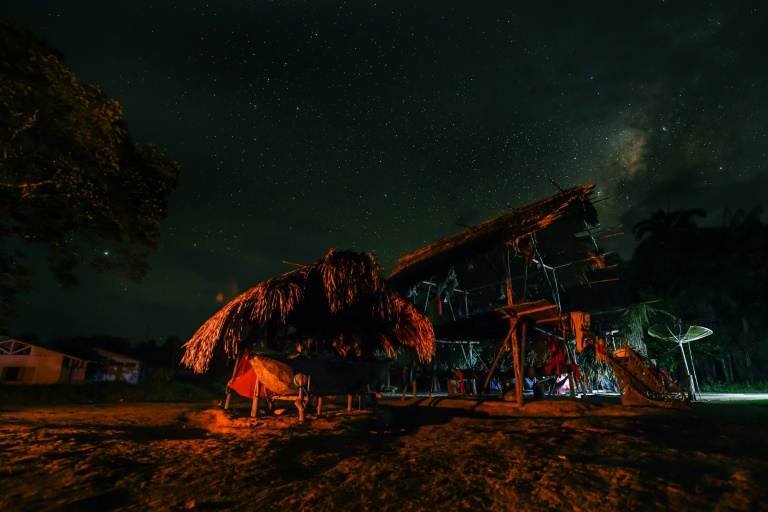Deep in the Amazon rainforest, it's that time again -- beer o'clock.
Members of the tiny, remote Waiapi tribe in Brazil’s eastern Amazon raise calabash gourds to their painted faces and quaff the homemade brew they call caxiri.
Draining the salad-bowl-sized gourd, usually in one go, they send for a refill, which is scooped from an enormous hollowed-out log resembling a canoe, only brimming with beer.
The tribesmen of Manilha village, dressed in red loincloths, black-and-red body art, and sashes made of bright beads, soon get merrily drunk.
The party, which kicks off after lunch and continues late into the star-filled night, was called in honor of the Waiapi river spirit, a giant anaconda-like serpent called Sucuri who demands constant appeasement.
But the Waiapi need little excuse to organize drinking sessions, preferably with a sing-song.

Waiapi tribe members enjoy the homemade beer known as Caxiri
“When you drink, your vision changes. You lose shame. Happiness comes and your feet start moving,” says Japarupi Waiapi, a 45-year-old chief visiting from a neighboring community.
As the caxiri flows, the music picks up.
Half a dozen men play bamboo flutes, others sing, and everyone takes turns to blow on a giant flute made from an embauba, or trumpet tree, about three yards (meters) long.
“We play the flutes so that Sucuri is happy and doesn’t snatch people when they swim,” Japarupi Waiapi says. “The river is very important. We use it to fish, to wash, to play in.”
Wiping his mouth after a deep drink of caxiri, the Waiapi chief thinks of another, entirely logical reason why the river spirit deserves honoring.
“If there were no river, there’d be no party.”
– Behind the scenes –

Waiapi people cross the Feliz river to harvest manioc to make Caxiri
The Waiapi are self-sufficient, able to do without electricity, phones, cars, most clothes or even money. But while everything they need for survival can be found in the forest, daily life as hunters and subsistence farmers can be grueling.
Caxiri is their one luxury.
Sometimes the tribesmen start in the morning for a casual sitdown and couple pints. Sometimes it’s an elaborate affair, a full-blown party, with other villages invited and going on all night.
“These caxiri bouts were mentioned by numerous travellers in French Guiana in the 1800s. There is no doubt that getting drunk was an important Wayapi tradition,” wrote anthropologist Alan Tormaid Campbell, who lived with the Waiapi in the 1970s, learned their language, and wrote a 2002 book “Getting to know Waiwai.”
Behind the scenes, though, it takes back-breaking work to make the tradition happen. And women, who drink caxiri in lesser quantities, are responsible.
Caxiri is brewed from cassava or yams, with beige or purple versions, coming in varying degrees of potency.
The cassava, also used to make tapioca, is harvested from a small plantation in a patch of cleared forest outside Manilha, where, lacking tree cover, the sun pounds ferociously.
Women get there by crossing a river, then hiking with tall backpacks woven from palm leaves, which they fill with tubers, before returning under the staggering weight.
Then in the village, the laborious process of grating, boiling, straining, wringing, baking, fermenting and otherwise transforming the cassava begins. The resulting beverage looks closer to soup than beer.

A Waiapi girl with her mother while harvesting manioc, the key ingredient for the craft beer Caxiri
Eriana Waiampi, 48, who like the other women on the expedition was topless and carried a machete, shrugged off the idea that this might not be worth the trouble.
“We are women. We are warriors to carry cassava,” she said.
– No beer, no future –
Within hours, the revellers at Manilha’s party had drunk their way through the entire canoe of beer. Fortunately, a second canoe load awaited at the other end of the village.
The increasingly enthusiastic musicians, huddling together and holding on to each other, played the same two notes over and over in a tireless, hypnotic rhythm.
Dancing in a bobbing motion, they shuffled through the village like mad pipers.
First they visited Manilha’s elderly chief who reclined in his hammock, singing along. Next, they visited the women, who drank in a rather less frenzied way.
At sundown, darkness swallowed the entire village, leaving only scattered points of firelight. But the party went on.
The musicians kept dancing and blowing, while men and women laughed and told stories around a central fire. One rather tipsy tribesman, covered in traditional Waiapi ink designs, reenacted a hunting scene, extending his arms to demonstrate the size of some recent prize.
Aka’upotye Waiapi, 43 and eldest son of the chief, looked content.
Caxiri isn’t just a way to get drunk, he said. It’s a way to bind Waiapi to their ancient ways and to keep the young from straying to the temptations of Brazilian towns.

Night falls at Manilha village in Brazil’s Amapa state
“If we don’t keep our culture through caxiri, the young will go there to drink non-Indian drinks,” he said. “Lose caxiri and we lose our culture.”
As the stars thickened over the rainforest and the night frogs chorused, guests began to drift off to their hammocks.
A few risked waking up to headaches, but no worry, Japarupi Waiapi said. The tribe has its own cure, a concoction of cassava, a cassava extract called tucupi and pepper.
“Drink that,” he said, “and no hangover.”






